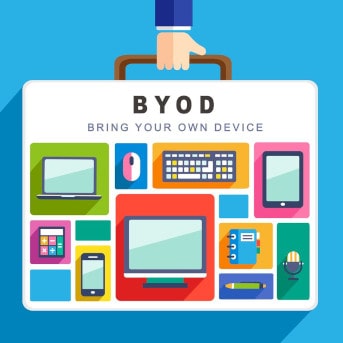The Pros & Cons of a Bring Your Own Device Policy

For just about every industry, the use of a mobile device while on the job is commonplace. In fact, not using a device for work would almost seem odd.
For many organizations, however, mobile devices in the workplace pose a tricky question: who provides the device?
There are two easy answers:
- Bring Your Own Device (BYOD)
- Here’s Your Own Device
The BYOD trend is all about companies allowing employees to bring their own devices to work to be used for work purposes. From collecting field data (inspections, photos, etc.), to tracking their time.
This is the opposite of the “Here’s Your Own Device” (HYOD) trend, which had historically been more common in companies – a program where the company gives employees mobile devices. Arlington Heavy Hauling decided to give their drivers tablets to allow them to complete paperwork while on the road, making it fast and easy to send data back to the office.
As with any new policy, there are pros and cons to BYOD that could influence the way people see the increasing prevalence of these policies in the workplace. Some companies may not even be fully aware of the advantages and disadvantages of BYOD.
A Bring Your Own Device policy provides plenty of positives. It also presents several tricky situations for employers. Here’s a breakdown of the pros and cons of implementing a bring your own device policy in your organization.
BYOD Advantages and Disadvantages
Advantages of BYOD Policies
Familiarity
One of the biggest pros in the BYOD program is that employees are able to use devices with which they are already familiar. The familiarity that employees have with their own devices allows them to collect data and tackle work-related tasks with increased ease and efficiency and in a more timely manner (because there is no time spent on getting comfortable with the device). Plus, mobile technology can boost workplace productivity.
Flexibility
By allowing employees to use their own devices, they are able to work anywhere at any time without needing to use other tools to access work documents. This removes the need to email copies of documents back and forth to be stored in your company system after being worked on.

A bring your own device policy also gives the employer greater flexibility to try out new solutions. Trying to collect field data with phones and tablets can be tough when there is technical set-up involved. If a team wants to run a pilot program to try a new mobile forms software, it’s far easier to do without having to go through layers of IT to get an app installed.
Financial Savings
BYOD means that employers save money, since they don’t have to buy devices for each of their employees. An added benefit of this is that employees are more likely to take better care of the devices, since they own them. This greatly reduces costs for repairs and updating, if there are any costs at all – a definite pro for BYOD.
Disadvantages of BYOD Policies
Liability
When it comes to blurring the distinction between work devices and personal devices, the question of who is liable for repair costs arises.
Who should pay for a new device if something goes wrong with it or if it gets stolen while on work time? What about when someone is using the device (or claims to be using the device) for work-related tasks outside of work hours and something goes wrong?
These are questions that need to be carefully considered and for which a solution ought to be provided before implementing the BYOD program in your company.
Security and Control
Wikipedia explains that BYOD refers to the policy of permitting employees to bring their personal devices (laptops, tablets, and smart phones) to their workplace, and to use those devices to access privileged company information and applications. Even though security on devices with access to private work information is important, it is more difficult to manage the security on personal devices.
Companies using a BYOD program have to contend with the fact that they will be relinquishing control over the appropriate use of employee devices. There’s only so much a company can do to ensure that the devices will be used appropriately.
Data Retrieval
After a contract has been terminated or when an employee leaves the company, it may be necessary to remove the company’s private information from the employee’s device, which could prove to be difficult. A plan should be in place to prevent the potential misuse of information.
Weighing the BYOD Pros and Cons? Have a Bring Your Own Device Game Plan
In order to limit the potential risks that could come from the implementing of a BYOD program, a policy should be put in place beforehand, explaining the expected and acceptable use of personal devices in the workplace (in place of company provided ones).
It is then the role of the employee to ensure that he or she fully understands the program’s policies before agreeing to them.
All in all, a well thought out BYOD policy and properly enlightened employees are important in guaranteeing the success of the program.
Already running a successful BYOD program? Interested in bringing a mobile forms software solution into the mix? Try a free 14-day trial of Device Magic.